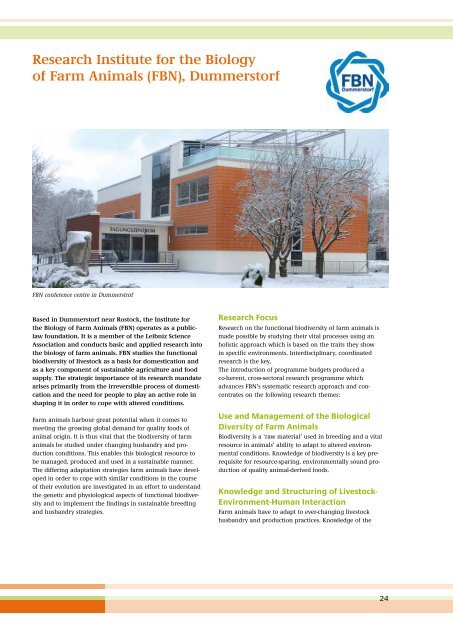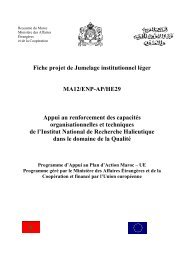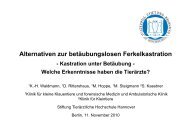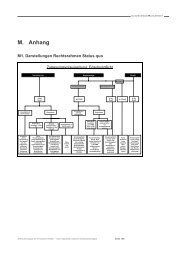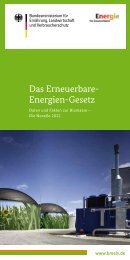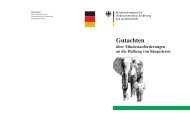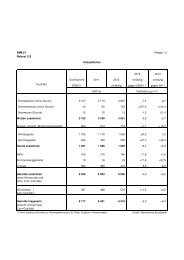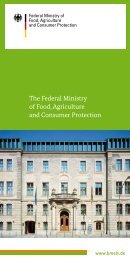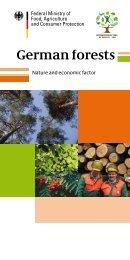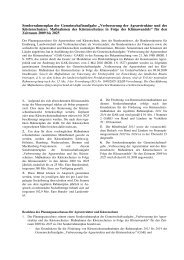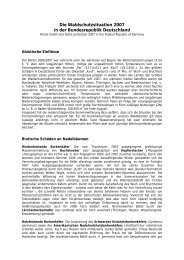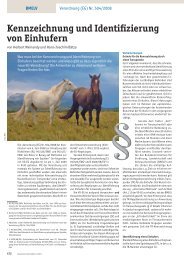Research Institutes overseen by the Federal Ministry of ... - BMELV
Research Institutes overseen by the Federal Ministry of ... - BMELV
Research Institutes overseen by the Federal Ministry of ... - BMELV
Create successful ePaper yourself
Turn your PDF publications into a flip-book with our unique Google optimized e-Paper software.
<strong>Research</strong> Institute for <strong>the</strong> Biology<br />
<strong>of</strong> Farm Animals (FBN), Dummerstorf<br />
FBN conference centre in Dummerstr<strong>of</strong><br />
Based in Dummerstorf near Rostock, <strong>the</strong> Institute for<br />
<strong>the</strong> Biology <strong>of</strong> Farm Animals (FBN) operates as a publiclaw<br />
foundation. It is a member <strong>of</strong> <strong>the</strong> Leibniz Science<br />
Association and conducts basic and applied research into<br />
<strong>the</strong> biology <strong>of</strong> farm animals. FBN studies <strong>the</strong> functional<br />
biodiversity <strong>of</strong> livestock as a basis for domestication and<br />
as a key component <strong>of</strong> sustainable agriculture and food<br />
supply. The strategic importance <strong>of</strong> its research mandate<br />
arises primarily from <strong>the</strong> irreversible process <strong>of</strong> domestication<br />
and <strong>the</strong> need for people to play an active role in<br />
shaping it in order to cope with altered conditions.<br />
Farm animals harbour great potential when it comes to<br />
meeting <strong>the</strong> growing global demand for quality foods <strong>of</strong><br />
animal origin. It is thus vital that <strong>the</strong> biodiversity <strong>of</strong> farm<br />
animals be studied under changing husbandry and production<br />
conditions. This enables this biological resource to<br />
be managed, produced and used in a sustainable manner.<br />
The differing adaptation strategies farm animals have developed<br />
in order to cope with similar conditions in <strong>the</strong> course<br />
<strong>of</strong> <strong>the</strong>ir evolution are investigated in an effort to understand<br />
<strong>the</strong> genetic and physiological aspects <strong>of</strong> functional biodiversity<br />
and to implement <strong>the</strong> findings in sustainable breeding<br />
and husbandry strategies.<br />
<strong>Research</strong> Focus<br />
<strong>Research</strong> on <strong>the</strong> functional biodiversity <strong>of</strong> farm animals is<br />
made possible <strong>by</strong> studying <strong>the</strong>ir vital processes using an<br />
holistic approach which is based on <strong>the</strong> traits <strong>the</strong>y show<br />
in specific environments. Interdisciplinary, coordinated<br />
research is <strong>the</strong> key.<br />
The introduction <strong>of</strong> programme budgets produced a<br />
co-herent, cross-sectoral research programme which<br />
advances FBN’s systematic research approach and concentrates<br />
on <strong>the</strong> following research <strong>the</strong>mes:<br />
Use and Management <strong>of</strong> <strong>the</strong> Biological<br />
Diversity <strong>of</strong> Farm Animals<br />
Biodiversity is a ‘raw material’ used in breeding and a vital<br />
resource in animals’ ability to adapt to altered environmental<br />
conditions. Knowledge <strong>of</strong> biodiversity is a key prerequisite<br />
for resource-sparing, environmentally sound production<br />
<strong>of</strong> quality animal-derived foods.<br />
Knowledge and Structuring <strong>of</strong> Livestock-<br />
Environment-Human Interaction<br />
Farm animals have to adapt to ever-changing livestock<br />
husbandry and production practices. Knowledge <strong>of</strong> <strong>the</strong><br />
24


